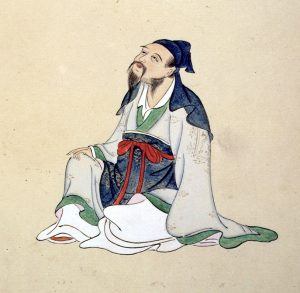Han Zhang at The New Yorker:
 In 724 A.D., the twenty-three-year-old poet Li Bai got on a boat and set out from his home region of Shu, today’s Sichuan province, in search of Daoist learnings and a political career. He wasn’t headed anywhere in particular. Instead, he began a life of roaming—hiking up mountains to Daoist sites, meeting men of letters all over the country, and leaving behind hundreds of poems about his travels, his solitude, his friends, the moon, and the pleasures of drinking wine. In the centuries since, Li’s verse, by turns playful and profound, has made him China’s most beloved poet.
In 724 A.D., the twenty-three-year-old poet Li Bai got on a boat and set out from his home region of Shu, today’s Sichuan province, in search of Daoist learnings and a political career. He wasn’t headed anywhere in particular. Instead, he began a life of roaming—hiking up mountains to Daoist sites, meeting men of letters all over the country, and leaving behind hundreds of poems about his travels, his solitude, his friends, the moon, and the pleasures of drinking wine. In the centuries since, Li’s verse, by turns playful and profound, has made him China’s most beloved poet.
In “The Banished Immortal,” a biography of Li, the novelist Ha Jin narrates the poet’s unusual life with erudition and empathy. Jin, a National Book Award-winning writer, is most known for his fiction, which is largely set in China during the Cultural Revolution and in Chinese immigrant communities in the U.S. One might easily take “The Banished Immortal,” his first work of nonfiction, as a departure from his previous work.
more here.
